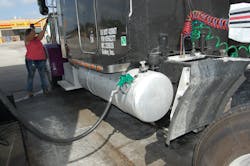Fleets looking to capitalize on low fuel prices face uncertainties
With global oil prices – and thus the cost of diesel fuel – expected to stay at relatively low levels for the foreseeable future, should that encourage trucking companies to change their strategies regarding alternative fuel investments and collaboration with railroad?
Those are but two questions several analysts are contemplating in regards to how the global transportation sector may be affected by sustained low oil prices.
Andy Schmahl and Andrew Tipping, partners in consulting company Strategy&’s Chicago office, recently dissected the impact of continued low oil prices on major transport modes – airlines, railroads, ocean carriers and of course trucking.
Based on their research, they believe while there are short- and long-term benefits for motor carriers in a low oil price environment, trucking firms should nonetheless tread carefully.
“The challenge is that no one knows how sustainable this ‘low oil price’ scenario really is,” Schmahl explained to Fleet Owner. “Right now, oil has ranged between $50 to $55 per barrel for a quarter. That’s not a trend but it’s also not a blip.”Tipping noted that U.S. tractor-trailers today generally run five to seven miles per gallon. Assuming an oil price of $60 to $80 per barrel, that makes the line-haul cost per container mile is $1.82 for trucks versus 37 cents for rail, according to U.S. Department of Transportation numbers. Lower oil prices, however, narrow that relative price gap meaning that – in the short term at least – motor carriers stand to gain higher margins while being competitive compared to the railroads.
“Trucking companies should look to recapture customers they may have previously lost when oil prices were higher; that’s already happening,” Tipping told Fleet Owner. “Trucking companies should seek to further exploit this trend by highlighting the speed and convenience they offer compared to rail.”
Yet Tipping cautions motor carriers that upending collaborative alliances with rail partners – especially in the intermodal segment – on the basis of “price inputs from just one commodity” may not be the wisest course of action.
“Can trucking companies ‘walk back’ some freight lost to railroads? Sure they can, but they need to be smart about it and not jeopardize long-term plans for short term gains,” he pointed out.
Another area where motor carriers need to tread carefully revolves around equipment replacement cycles and alternative fuel investments.
Right now, lower fuel costs could allow trucking companies to keep older, less fuel-efficient vehicles on the road longer -- assuming they are compliant with emissions standards, Tipping noted.Yet that advantage would be lost if and when oil prices – and thus diesel fuel prices – increased.
They added that investments in alternative fuels – especially in natural gas-powered equipment -- looked very logical when oil was well over $70 per barrel, but become less attractive as oil prices drop. “Transportation companies will need to balance investment in natural gas programs if oil prices stay low for the long term,” Schmahl said.
Yet he stressed that low fuel prices also allows trucking companies to accrue significant savings, raising another related question; should such savings be used as an “investment fund” to buy more new equipment and/or fund further investment in alternative fuels in order to get a jump on the competition?
“When disputations such as low oil prices occur, it always introduces new strategic factors to be considered,” Schmahl noted. “So it’s smart for trucking firms to use this ‘reprieve’ from nominal operating costs to explore longer-term efforts. It could be an opportunity to improve competitive efficiency for the future.”
Rosalyn Wilson – senior business analyst for Parsons and author of the annual State of Logistics report (sponsored by Penske Logistics) – added that the rapid rise of domestic U.S. oil production is another factor that motor carriers need to consider as well.
Record domestic oil production is adding to that downward price pressure as well, EIA added.
According to the Energy Information Administration (EIA), U.S. crude oil production overall increased by 1.2 million barrels per day (bbl/d) to 8.7 million bbl/d during 2014 – the largest volume increase since recordkeeping began in 1900, the agency said.
On a percentage basis, output in 2014 increased by 16.2%, the highest growth rate since 1940.
“This is not something that trucking will see of immediate benefit because it’s not as of yet affecting the grade of fuel the industry buys,” she explained.
Thus, while the U.S. has become a net exporter of oil over the last several years, it remains a net importer of “finished fuels” at the moment.
Yet that will change quickly, Wilson believes. “This is a completely new scenario; that the U.S. can become largely self-sufficient in terms of its energy needs,” she stressed. “We are now starting to produce the right grades of fuel from the oil we produce and that bodes really well from a trucking perspective.”
About the Author
Sean Kilcarr
Editor in Chief
Sean Kilcarr is a former longtime FleetOwner senior editor who wrote for the publication from 2000 to 2018. He served as editor-in-chief from 2017 to 2018.


